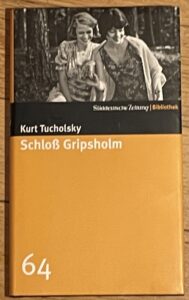In Schloss Gripsholm (Castle Gripsholm) Kurt Tucholsky, one of Weimar Germany’s leading journalists and satirists tells of a summer idyll in Sweden, several weeks with a lady friend where they while the days away, a couple of friends come to visit, and various amusements take place. The book begins with a putative exchange of letters between Tucholsky and his publisher, in which they haggle over royalties and the publisher asks him for a love story. Tucholsky replies that he’s walking out the door to go to Sweden, he could maybe manage a summer story. And thus does Schloss Gripsholm acquire its subtitle: A Summer Story.
After placating and provoking his publishers, Tucholsky, in his guise as first-person narrator, picks up his friend and lover Lydia, whom he generally calls “the Princess,” and they dash for the train to Copenhagen. Thence to Sweden where they spend a few days searching out a place to stay with the help of a local guide who’s facile, if not fluent, in numerous languages. He speaks German to Tucholsky and the Princess, but with a strong American accent and long rolling R’s. He lets them in on the secret of being a guide for visiting Americans: give them lots of numbers. The numbers don’t have to be true, they just have to be delivered with confidence and sincerity. Tucholsky then riffs on the whole concept, inventing histories for the buildings they see and the people who cross their path. Does it matter if any of it is true? Not on a summer holiday.
Herr Bengtsson explained the castle to us, the way he had to his Americans, the akvavit sang forth from him, and after every historical date he said “But so exactly, I am not quite sure,” and then later we looked it up in the Baedeker and every last bit of it was wrong — and we were extremely happy. There was a dungeon where Gustav the Constipated had locked up Adolf the Unshaven for years at a time… (p. 32)
Tucholsky has the knack of making the idle days of summer seem as luxurious as a cat stretching in a sunbeam, as refreshing as skinny dipping on a hot afternoon. The elderly lady who looks after the house on the castle grounds where they are saying says it’s not true that Swedes always swim naked and then proceeds to list the times that they do, until it’s clear that that amounts to pretty much every time. Sometimes Tucholsky’s silliness is more explicit, as when his friend Karl (called “Karlchen,” in English “Little Karl”) comes to visit and they send nonsense telegrams every day to their mutual friend Jakob. “flown-in karlchen just almost already arrived wiring immediately, whether you want to wire immediately stop granny unfortunately fell out of swing – granddaddy” (p. 71)
Sometimes more serious things come up, as when the Princess relates how she fended off a pass from her boss, and passes along some further views. “Men don’t understand. What good would come of it? I would have to share his worries like his wife, work like his secretary, and if all was going well then some evening he would stand in the middle of the room with someone else and ask whether she had a boyfriend…” Tucholsky asks whether she thought of him at all. No, she says, “I don’t think of you unless the man is not totally out of the question.” (p. 75) Nothing stays serious for long.
First Karlchen visits and then a little later Lydia’s friend Sybille (Billie) comes to visit. The days pass in banter and amusements. Even when they help a little girl who’s running away from a sadistic schoolmarm, it’s a simple matter. Tucholsky comes up with what he calls a cynical prescription for curing the schoolmistress’ foul disposition — Penis normalis, dosim Repetatur! — but, perhaps wisely, he does not share that thought with Lydia, just with readers (p. 135).
Tucholsky is also very taken with Plattdeutsch, the North German dialect that the Princess and their friends speak. He finds it livelier and more soulful than standard German. In contrast to the Bavarian in Die Rumplhanni, I couldn’t always follow the Platt, so I missed the jokes and other notions that they shared in dialect.
Schloss Gripsholm feels light, almost weightless, but that’s not an easy effect to achieve. I suspect that it will stay with me longer than many a heavier work. Like the memory of a great summer day.


1 pings
[…] hinter Dukla (Dukla — the title of the Polish original is also just Dukla) 64. Kurt Tucholsky: Schloss Gripsholm (Castle Gripsholm) 65. Colette: Mitsou 66. Nuruddin Farah: Maps 67. Joan Aiken: Du bist ich (US: […]